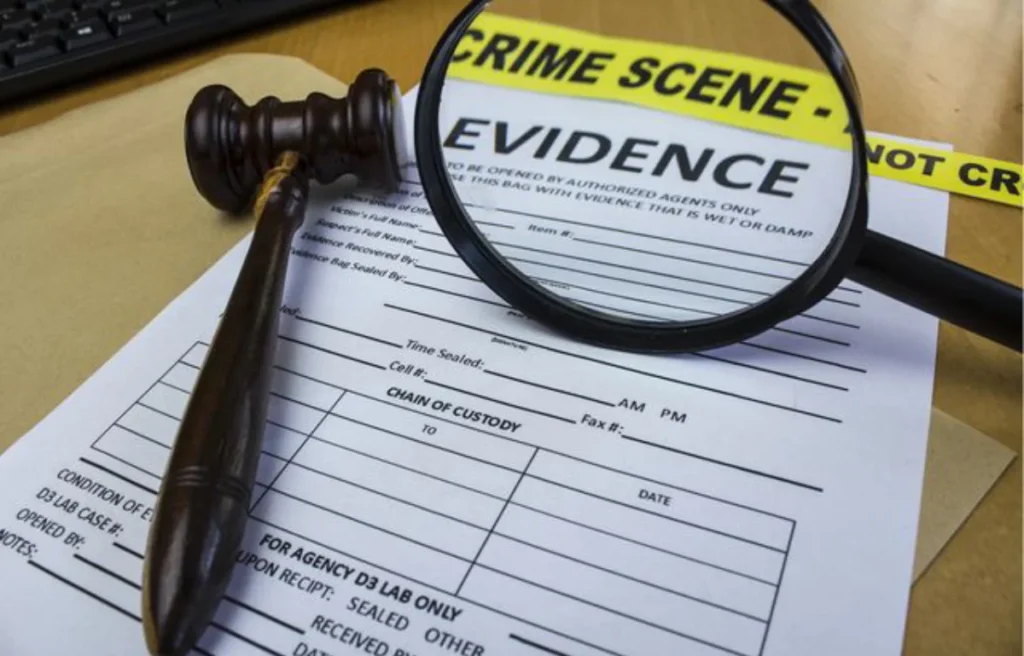
What exactly happens after a crime is discovered, and how does it end up in a courtroom? The process “From Crime Scene to Courtroom” can be long and complex, but it is essential for delivering justice. Without strict procedures and expert involvement, crucial evidence can be lost, potentially letting offenders go free. In this article, you will find a comprehensive breakdown of every step—from securing the crime scene to courtroom preparation—highlighting how each stage plays a role in a successful investigation. Stay with us as we guide you through this fascinating and vital journey.
1. Initial Response and Crime Scene Management
The initial response to a crime scene is critical. The first officers or investigators on the scene are responsible for securing the area and preventing any potential contamination of evidence.
Key Actions:
Securing the Scene: Ensuring that the area is cordoned off to prevent unauthorized access.
Documenting the Scene: Taking photographs and making sketches to record the scene as it is found.
Collecting Evidence: Gathering physical evidence such as fingerprints, blood samples, or weapons.
Role of Private Investigation Agency:
Private investigators, including those from a reputable detective agency in Kolkata, can assist by providing additional expertise in securing and documenting the scene. They can also offer specialized equipment and techniques for evidence collection.
2. Evidence Collection and Preservation
Once the scene is secured, the next step involves the careful collection and preservation of evidence. This step is crucial to ensure that evidence remains uncontaminated and is admissible in court.
Key Actions:
Evidence Collection: Gathering items such as clothing, biological samples, and objects from the crime scene.
Chain of Custody: Documenting every person who handles the evidence to maintain its integrity.
Labeling and Storage: Properly labeling and storing evidence to prevent cross-contamination and degradation.
Role of Private Investigation Agency:
Private investigators are skilled in evidence handling and can help in ensuring that evidence is collected and preserved correctly. They also use advanced techniques for analyzing and interpreting evidence.
3. Investigation and Analysis
With evidence collected, investigators move on to analyzing the information and identifying potential suspects. This stage often involves interviewing witnesses, reviewing surveillance footage, and analyzing forensic evidence.
Key Actions:
Witness Interviews: Conducting interviews with people who may have seen or heard something related to the crime.
Suspect Interrogation: Questioning suspects to gather more information and test their alibis.
Forensic Analysis: Using scientific methods to analyze evidence such as DNA, fingerprints, and ballistics.
In addition to traditional investigative methods, address verification services play a critical role in locating suspects, witnesses, or persons of interest. Accurate address verification helps investigators confirm the current residence or previous locations associated with individuals, ensuring that interviews and follow-ups are efficient and reliable. Integrating these services enhances the overall effectiveness of the investigation phase.
Role of Private Investigation Agency:
Private investigation agencies often have access to specialized resources and databases that can aid in locating witnesses and suspects. Their expertise in interviewing techniques and forensic analysis can provide additional insights.
4. Developing a Case and Filing Charges
Once enough evidence is gathered, investigators work with prosecutors to build a case. This involves reviewing all the evidence and preparing a case that can stand up in court.
Key Actions:
Case Compilation: Organizing and presenting evidence in a way that supports the case against the suspect.
Legal Consultation: Working with legal experts to understand the implications of the evidence and to ensure that it meets the legal standards for prosecution.
Filing Charges: Submitting the evidence to the prosecutor who will decide whether to file charges and proceed with the case.
Role of Private Investigation Agency:
A private investigation agency can assist in compiling evidence and presenting it in a coherent manner. They can also provide expert testimony and assist legal teams in understanding complex evidence.
5. Courtroom Preparation and Testimony
Before a case goes to trial, investigators and attorneys prepare for court by reviewing all evidence, rehearsing testimonies, and developing a strategy for presenting the case.
Key Actions:
Trial Preparation: Reviewing evidence, preparing witnesses, and developing a strategy for presenting the case in court.
Expert Testimony: Providing expert opinions and explanations related to the evidence and investigation.
Courtroom Presentation: Presenting evidence and testimonies in a clear and persuasive manner to the judge and jury.
Role of Private Investigation Agency:
Private investigators may be called upon to provide expert testimony in court. They can explain technical aspects of the investigation and evidence, helping to clarify complex points for the jury.
6. Post-Trial Actions
After the trial, there may be additional steps, such as handling appeals or ensuring that the verdict is carried out appropriately.
Key Actions:
Appeal Process: Addressing any appeals filed by the defense and reviewing the trial’s outcome.
Case Closure: Ensuring that all legal and procedural matters are resolved and that the case is officially closed.
Role of Private Investigation Agency:
Private investigators can assist in reviewing trial outcomes and investigating potential grounds for appeal. They also play a role in ensuring that justice is fully served by investigating any new leads or evidence that may arise.
Conclusion
The process of a criminal case investigation is complex and involves multiple steps, from the initial response at the crime scene to the final courtroom proceedings. Each stage requires careful attention to detail, collaboration among various professionals, and a commitment to justice. A private investigation agency can significantly enhance this process by providing specialized skills and resources, ensuring that each step is handled with precision and expertise.
Whether securing a crime scene, collecting and analyzing evidence, or preparing for court, the role of a private investigation agency is integral to achieving a thorough and effective criminal case investigation. By understanding the step-by-step process and the importance of each stage, we can better appreciate the meticulous work involved in bringing justice to light.
